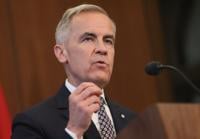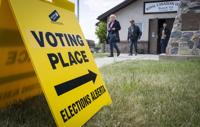EDMONTON - It was 10 years ago this month that Edmonton city staff returned a national traffic safety award when the councillors of the day voted to rip up a trio of bike lanes that played a small role in winning the prize.
Councillors considered the lanes unsafe and underutilized. Edmonton has since built a flurry of new lanes to higher standards in busier areas.
But the spectre of lane removals is again looming — this time over both of Alberta's major cities.
In recent months, Transportation Minister Devin Dreeshen has said he thinks Edmonton and Calgary have been going the wrong way when it comes to building bike infrastructure.
He has said the province hasn't ruled out stepping in.
In April, Dreeshen called on Edmonton and Calgary to remove bike lanes from "major corridors," as he said they clash with provincial goals and investments in expanding roadway networks for vehicles.
Dreeshen, in an April interview, said his eyes were set on four already-finished bike lanes in Edmonton, plus an additional project that was nearly complete. When it came to Calgary, he said he hadn't done the same level of digging for examples.
He traded brief letters with Calgary Mayor Jyoti Gondek earlier this summer over the future of bike infrastructure in her city, and the two are set to meet Wednesday to discuss next steps.
Just like the reasoning used in 2015 by Edmonton councillors, Dreeshen has said the lanes he's concerned about aren't being used enough to justify their cost and, in turn, are making commutes longer for drivers.
Francisco Alaniz Uribe, a professor at the University of Calgary's School of Architecture, Planning and Landscape, said little has changed in the politics of bike lanes over the past 10 years.
He expects it to remain a political conversation for years to come.
"We are in a moment where we're shifting some of our values of what we have been doing for decades, which is to prioritize the car on the street," Alaniz Uribe said. "And that has come to a point where you cannot continue to add capacity to that — there's no more room for extra lanes.
"But the political part of it is that there's a huge pushback on these changes for people that are accustomed and used to what is the status quo."
He said what's usually missing in the political conversation around bike lanes is data.
"They make streets safer, they allow for other aspects of urban planning to develop like making our cities more compact and building housing closer to employment centres, not having to spend so much money on parking, and even opening space for trees and green infrastructure," Alaniz Uribe said.
"It is very difficult to talk about those in this kind of political conversation. Is it really the issue — bike lanes — or are we talking about more (of) a resistance to change?"
City planners in Edmonton and Calgary say the actual percentage of cycling infrastructure that shares the road with cars is small in terms of each city's overall cycling network.
In Edmonton, separated bike lanes and painted, but not protected, bike lanes make up just five per cent of the city's roughly 1,500 kilometres of cycling infrastructure, said Natalie Lazurko with the city's infrastructure department.
Just how much of that five per cent meets the "major corridor" threshold set by Dreeshen is unclear. Earlier this month, his office said the province is undertaking a review of existing bike lanes in both cities.
Dreeshen has said the province hasn't ruled out stepping in to remove existing bike lanes, and that Alberta could follow Ontario in legislating that any new bike lane coming at the price of removing a vehicle lane would require provincial approval.
Ontario’s law, passed last year, also gave it the power to order municipalities to remove bike lanes and reinstall traffic lanes. A Charter challenge has been launched against parts of the bill, and awaits a judicial ruling.
Lazurko said it would be difficult to pivot if the province or the next city council were to act on anti-bike lane urges.
Adapting to new directions handed down by elected officials is also just part of the job, she said.
"Right now, we have a plan. Council has approved that plan. We're moving forward with that mandate," said Lazurko.
The plan, approved by council in 2020, set Edmonton's philosophy around bike infrastructure as being necessary to ensure residents have options to get around as the city grows.
"We have to rely on other ways of getting around. Otherwise, we're going to be living in congestion all over the place," Lazurko said.
"We're not moving away from vehicular travel in Edmonton — that's never going to happen — but we are looking at providing more opportunities for people to travel in a different way."
A spokesperson for Edmonton Mayor Amarjeet Sohi, who, unlike Gondek, isn't seeking re-election in the municipal elections this fall, said the minister hadn't requested a meeting with him about bike lanes.
This report by °µÍø½ûÇø was first published July 29, 2025.















































